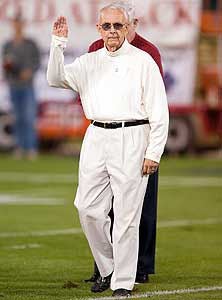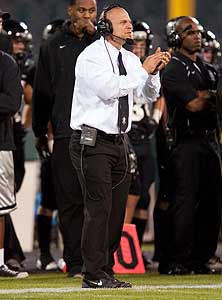In Southern California, no team has been more successful the past two seasons than the one at
Servite (Anaheim, Calif.).
The Friars won the Southern Section Pac-5 Division title, then beat Rocklin to win the Division II State Bowl championship. In doing so, they beat three consecutive unbeaten teams, including Mission Viejo and Edison-Huntington Beach.
It was the first section title since 1983, and it came on the 50th anniversary year of Servite's first, the Small Schools co-championship in 1960 with 26 players – and not a senior among them.

Miller was honored at halftime two weeks
ago during Servite's Golden Anniversary
game with Mater Dei at Angels Stadium.
Photo by David Hood
It was the school's first varsity team, coached by a young man who wasn't much older than the players themselves.
Bill Miller had done a three-year tour in the Navy, although his overseas duty was defined differently than most: He was stationed in Bermuda and was part of special services, which meant he had been assigned to the base's touring football team. An outside linebacker and a guard/tackle, his day-to-day duties in camp included checking out equipment to soldiers and opening up the base theater.
"I had it pretty good, but I think (serving) is worthwhile," Miller said on the eve of Veterans Day. "All those guys in combat, what those guys went through in Guadalcanal and Iwo Jima, they should be honored."
His experience in the service also prepared him for his career as a coach. He has been one of the state's most successful, coaching alongside the legendary Clare Van Hoorebeke (whom he played for in 1951 as part of Van Hoorebeke's first league championship team at Anaheim) and building Placer-Auburn into a state football power.
But it started with Servite. He had been working for the Parks and Recreation department, as well as officiating games at night, and he had developed a reputation for being a good coach of elementary school children.
The priests at Servite hired him right on the playground in 1958 as the school's first football coach. He was paid $100 per month to coach football, basketball and baseball at the all-boys' Catholic school. In 1960, the school's first varsity football team shared the Small Schools championship with Santa Ynez despite being big underdogs throughout the season.
Miller, along with most of the surviving players, cheerleaders and coaches, were among those honored at halftime two weeks ago during the Golden Anniversary of the rivalry with Mater Dei at Angel Stadium.
Servite took care of business that night with a 21-14 victory, just as Miller's team had taken care of business five decades earlier. The last Servite game he watched – apart from the 2009 Bowl victory over Rocklin that he saw on television – was the 1961 game against Mater Dei, the first meeting between the schools.
The celebratory weekend allowed Miller a chance to finally meet Troy Thomas, who has guided Servite to six consecutive league titles, the most recent clinched last week with the Friars' 20th consecutive victory.
"It was great because you could see how far Servite has come," Miller said. "The coaching is fantastic and the type of kid they are producing is wonderful.
"We shook every player's hand on the way to the field. We met Coach Thomas, talked about the program. I just totally believe in what he's doing there, he's doing more than producing a football player, but great young men. It's a school you'd want your kid to go to, that's for sure.
"I think he's very thorough as a football coach, but he's more interested in the man than the football player and what they do after they graduate. He seems like he believes in what's great for young men, morality, belief in God, hard work. I love the whole concept. Winning's important, but it's not the most important thing."

Thomas (center) is leading the
right way, according to Miller.
Photo by David Hood
In Thomas' philosophy, the winning will take care of itself if the other aspects of the program are in place. He was excited to finally get a chance to meet Miller.
"The neat thing is the oneness that we're trying to instill in players today is the same that he was trying to instill back then," said Thomas, who has been co-writing a book about Servite's 2009 championship season and the school history that laid the foundation for its success. It's called
Credo: Forever Champions.
"For me it was a tremendous honor to finally get to meet him. Knowing the things that he tried to start here at Servite – not knowing it at the time when I got here – we had a lot of similar philosophies and it was great to know we were trying to carry on some of the same traditions and build the same characteristics that he was trying to establish. He was trying to teach young men how to become better men, and I think that's what he was all about."
One of the standing traditions at Servite is Camp Week, which was begun on Miller's watch when the school's locker room was finally completed. Miller christened it with a slumber party. For four days, from 7:30 a.m. until sunset, the burgeoning first Men of Servite practiced. They slept in sleeping bags in the locker room and were awakened at 7 a.m. by Miller's air horn. Without warning, one day Miller blew the air horn at 5 a.m., and the team was soon doing jumping jacks in the nighttime dark. A police cruiser drove into the parking lot and shined a spotlight on Miller in mid-yell and suspended the practice until sunrise.
Miller had some advanced ideas, even then. He enlisted a female psychologist to address the team about sleep teaching methods. When the team bedded down for the night in the locker room, Miller fired up the turntable as the voice intoned the boys to be the best football players they could be. At the end of Camp, each player received a copy of the record to play at home when he went to bed.
Make no mistake, Miller was a tough guy. The first Servite playbook included Miller's original line: "To play your best you must like body contact – that's football!"
He also had a drill that was borderline criminal called "Party Time." It existed in two versions. In one, he would blow his whistle in a quick sequence and players would stop what they were going and begin beating the crap out of the nearest teammate as a means of toughening them up. Another version was more formal, in which players formed a circle and two combatants entered the ring of competition. Party Time was relegated to the history bin when Stephen Zamora broke his hand slugging his teammate's helmet, the bone of his thumb protruding through the skin.
There were times during their first season when Miller and his assistant – and successor in 1961 – George Dena suited up in pads to knock around the players when they weren't getting the point, "which was stupid," Miller, 76, says today.
His tenure at Servite was filled with the mistakes of inexperience – bear crawls on hot asphalt was one of them -- but he had developed loyal players who were undersized but tough, not unlike the players Thomas was so successful with last season and again this season.
"It's like going through Navy Seals training," Miller said of his group of underdogs. "Once you made it through, you were an elite group, and that's the way they were."
Miller left Servite after his championship season and joined Western, but the school reneged on a promise to be head coach so he joined Van Hoorebeke at Anaheim for seven years. He also coached at Long Beach State for three seasons, then went to Northern California where he really made his name in high school sports. He joined
Placer (Auburn, Calif.) in 1972 and built the Hillmen into a perennial Sac-Joaquin Section power. In 11 seasons, his teams won seven league titles and five section championships.
Yet proving he could do more than just coach football, after his retirement he coached girls' tennis for 12 seasons and won nine section titles, including eight in a row. He also coached football again, two seasons at
Nevada Union (Grass Valley, Calif.) as an assistant, and helped his grandson Joey Montoya build the program at Pioneer-Woodland. Montoya is now in his fourth season as the head coach at Placer.
Miller's most recent coaching came in 2009 as he coached Placer QB Colin Burnett; the Hillmen went 12-2 and reached the section finals under the direction of Miller's young ward.
Now, six years into Parkinson's Disease, Miller says his days of coaching are officially over. But the Penn Valley, Calif., resident remembers that first season almost like it was yesterday.
"It was an amazing time," Miller said. "I had such admiration for those kids who were so darn tough to hang in with the stuff we threw at them.'
